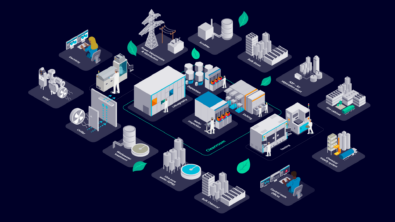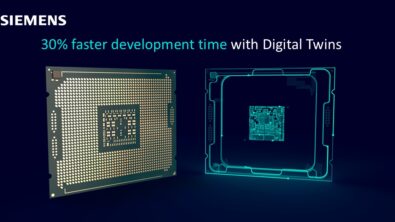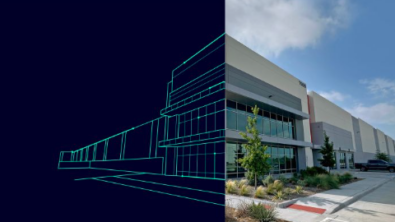Scale up Smart to reduce carbon.
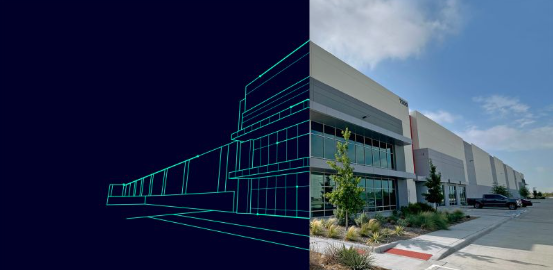
Alan Porter, Global VP, Electronics Industry, Siemens Digital Industries Software –
Post 2 in our Blog Series, “Sustainability in Electronics. Every Detail Matters.”
As the world urgently needs more sustainable practices, smart manufacturing for electronics becomes vital. The demand for smart products powered by electronics—such as smartphones, watches, computers, smart appliances, medical devices, smart buildings, transportation systems, data centers, and smart grids—continues to grow exponentially. AI-powered applications add further pressure to this demand. Consequently, the responsibility to ensure their design and production are environmentally responsible also increases. As a result, the process of designing and producing sustainable electronics products is becoming even more complex, demanding meticulous attention to every detail.
How can manufacturers meet the rising demand for sustainable electronics products while maintaining efficiency and reducing costs?
Today’s electronics companies grapple with escalating innovation complexity amidst rapid technological progress, necessitating intricate designs and seamless hardware-software fusion. To keep pace with changing customer preferences and competitive pressures, while addressing sustainability requirements, companies must expedite time-to-market. Supply chain disruptions from global events present unexpected hurdles, resulting in shortages that impact production schedules and profitability. In this extremely competitive landscape, design innovation and designing for sustainability are both crucial and challenging.
At the same time, the industry is facing environmental issues that must be addressed through the sustainable design and production practices of smart manufacturing, working in collaboration with manufacturing equipment engineering and machine builders to evolve one cohesive system that minimizes the environmental footprint. The ability to scale up smart to meet demand while reducing carbon and other environmental risks is essential to the industry’s future.
What are the environmental challenges?
The environmental challenges across the electronics industry are formidable. Back in 2019, only 17% of e-waste was documented to be collected and properly recycled globally, meaning that 44.3 million tons of raw materials conservatively valued at USD 57 billion were discarded in one year.1 But that was then, and the situation has since intensified. With global electronic waste now projected to reach more than 74 million metric tons by 20302, there is a looming environmental challenge that needs to be mitigated before it overwhelms our collective ability to contest it. On top of that, a 2022 IDTechEx report, “Sustainable Electronics Manufacturing 2023-2033“, confirms that the electronics manufacturing industry contributes 4% of global greenhouse gas emissions.3 Clearly, the current levels of waste production and greenhouse gas emissions is no longer acceptable. Or sustainable.
The time is now to move toward a more sustainable future
To meet these critical environmental demands, how can you scale up electronics design and production to ensure smart and secure processes, while minimizing the environmental impact and resource consumption?
The key to success is having the right partner for a sustainable digital transformation.
At Siemens, we provide the leading end-to-end sustainability solutions in electronics and semiconductor manufacturing. With unique experience and proven capabilities, Siemens can support your entire value chain from design to production.
Together toward a smarter, more sustainable electronics industry
Siemens is committed to promoting sustainable practices and programs within the electronics industry. Our smart manufacturing solutions enable electronics companies and machine builders to collaborate to minimize their environmental footprint while maximizing productivity.
By fostering an environment of open collaboration and standardization, electronics companies can navigate the complexities of the industry more effectively and collectively propel the field forward, ensuring a sustainable future for all stakeholders involved.
We offer Digital Twins that help produce energy efficient technologies and intelligent automation systems that enable manufacturers to operate in a more sustainable manner. Digital Twins are key to the planning and optimization of plants, resources and energy efficiency on all levels. Digital Twins provide the capability to simulate multiple what-if scenarios that can be evaluated virtually to optimize products, production and performance – without interrupting real-time production.
Siemens – your partner and guiding compass in digitalization and automation
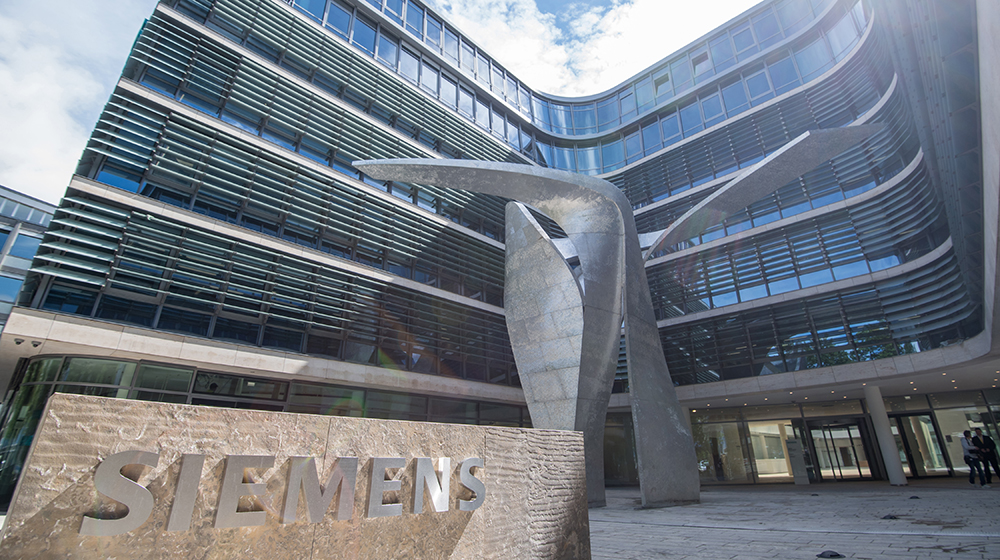
At Siemens, we are a trusted global technology leader in digitalization and industrial innovation and automation, helping organizations of all sizes digitally transform using software, hardware, and services from the Siemens Xcelerator open digital business platform. Our solutions provide the expertise to seamlessly integrate design tools such as EDA and PLM (Product Lifecycle Management) software to intelligent technologies such as AI, IoT, and edge devices into manufacturing operations. Which equips us to deliver business value by crafting complete digitalization roadmaps across the entire product lifecycle. Our extensive portfolio of capabilities supports the electronics industry throughout the entire design to production process.
From initial consultation and implementation to maintenance and training, we are with you every step of the way, ensuring smooth operations and maximum productivity. This commitment extends to providing tailored solutions aligned with the specific challenges of electronics companies. Serving as your digitalization partner, we bring unparalleled expertise across industries, technologies, and manufacturing operations.
Siemens is the only manufacturing partner with end-to-end solutions experience in electronics manufacturing and sustainable solutions, making us your ideal choice to support your sustainability goals.
We want to earn your trust as a partner in your digital transformation journey, offering your company not just leading solutions, but a mutual collaboration for sustainability and uninterrupted growth and success.
We not only serve as trusted digitalization partners to numerous manufacturers globally, but we also share what we have learned in our own factories worldwide.
Siemens Electronics Works Amberg. Where we slip into our customers’ shoes
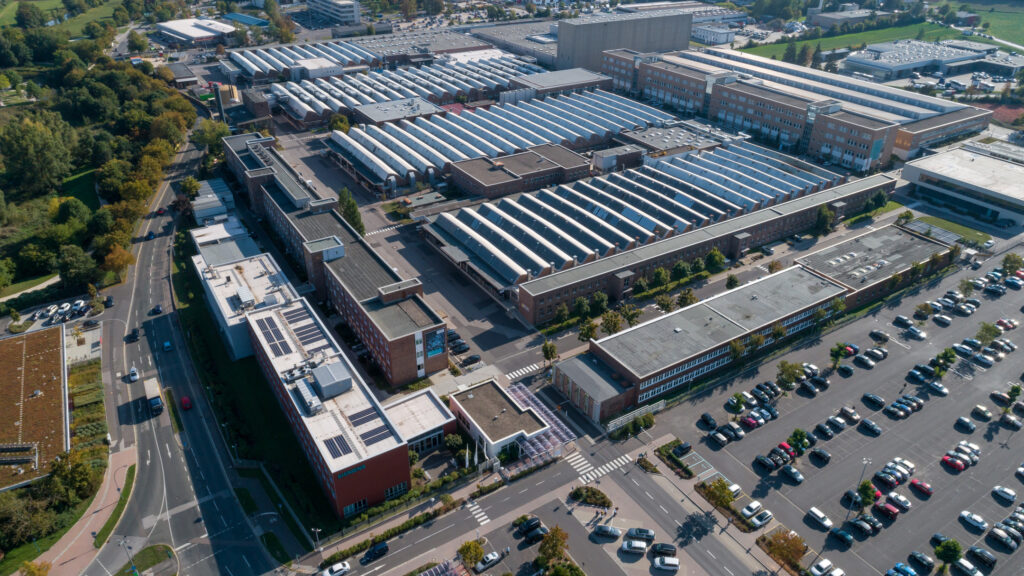
At Electronics Works Amberg (EWA), a sustainable future comes to life every working day. This digital factory in Amberg, Germany, is where we have taken our own digital transformation journey for next-level manufacturing agility. It is a live example of how we don’t just provide solutions, but we also operate our own factories worldwide where we strive to better understand our customers’ challenges.
Electronics Works Amberg is a Digital Enterprise that shows how Siemens is consistently pursuing the digital transformation of industry. At Electronics Works Amberg, whether it’s optimized throughput, ambitious cycle times, or reliable cybersecurity measures, energy management in production, the future of manufacturing is already a reality, thanks to numerous solutions from the Digital Enterprise portfolio.
At EWA, digitalization and automation enable us to continually improve productivity and sustainability:
– 6% efficiency gain achieved every year since 2016
– Reduced energy consumption per volume by 47% while maintaining the same footprint, higher product complexity, and more employees
– 17 million products produced annually for 65,000 customers
– One product produced every second
– Continuous improvements are pushing results toward 100% process quality
– The Electronic Works Amberg Plant is scheduled to be CO2-neutral in 2026
– SiGREEN is an innovative sustainability tool developed at EWA that companies can use to manage a product carbon footprint (PCF) based on verifiable data from the shopfloor and the upstream supply chain: www.siemens.com/global/en/company/sustainability/product-carbon-footprint.html
As a result, EWA is a prime example of a Siemens Digital Enterprise that will continue to consistently lead the way for sustainable electronics manufacturing into the future, which helps us gain the insights needed to provide unparalleled expertise to assist you in your digital transformation journey.
The sustainable way forward
Siemens smart manufacturing solutions empower electronics companies to quickly enhance production capabilities while adhering to sustainability practices. Our end-to-end solutions aim to reduce carbon footprints and optimize the use of water, energy, and chemicals, ensuring safer handling of hazardous materials. Additionally, they support responsible sourcing and utilization of materials, contributing to a more sustainable manufacturing process.
“Did you know that 80 percent of a product’s sustainability impact is determined in the design phase? That makes design an especially crucial phase for integrating sustainability.”4
– Eryn Devola, Vice President of Sustainability, Siemens Digital Industries Software
Sustainable design-to-production practices reduce carbon emissions through smart manufacturing capabilities. These capabilities include product and plant simulation to optimize production, energy-efficient equipment, and renewable energy sources. Additionally, automation and AI contribute to energy savings, enhanced efficiency, yield, and quality control. Closed-loop manufacturing further supports continuous learning and improvement.
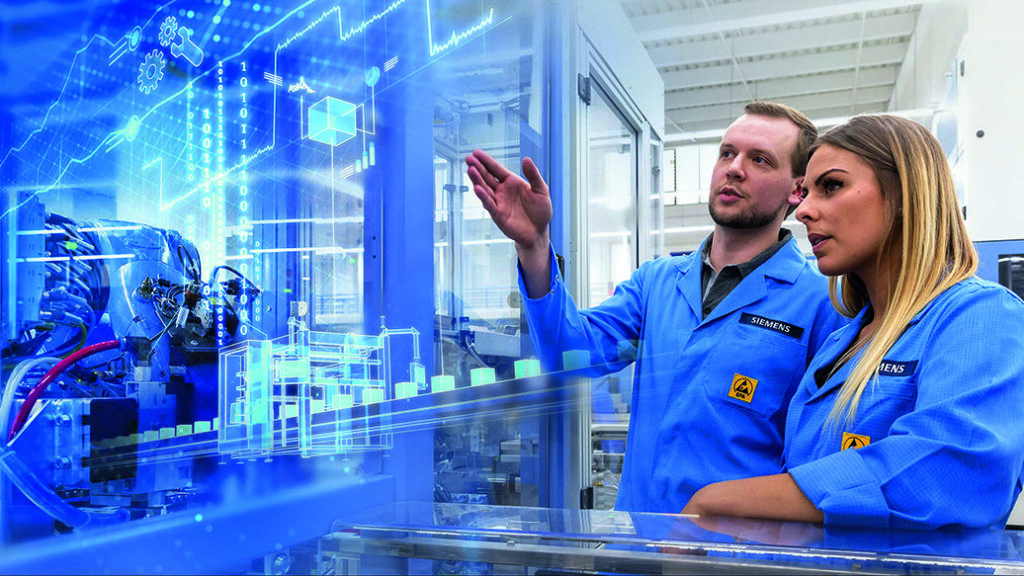
Smart manufacturing harnesses the synergy between Digital Twins and IoT, alongside EDA and PLM (Product Lifecycle Management) tools. Combined with sophisticated plant and machine automation hardware and software, this integration ensures seamless operations. The result is a robust foundation for efficient and sustainable electronics manufacturing. As a result, smart manufacturing puts scalable, sustainable, high yield electronics manufacturing within your reach.
Very smart. But just as important, sustainable.
For a closer look at how Electronic Works Amberg is achieving its productivity and sustainability goals, visit https://blog.siemens.com/2024/03/increasing-efficiency-in-production-and-ensuring-employee-flexibility-at-the-same-time/
You are also invited to explore our sustainability blog for a wealth of compelling information https://blog.siemens.com/space/all-for-sustainability/
References:
2. (The Global E-waste Monitor 2020, Forti et al 2020, Pages 24, 58: https://www.greene.gov.in/wp-content/uploads/2020/12/2020120929.pdf )
3. Research Highlights: The Future of Sustainable Electronics Manufacturing, Dr Isabel Al-Dhahir, Dec. 12, 2022, https://www.idtechex.com/en/research-article/the-future-of-sustainable-electronics-manufacturing/28357
